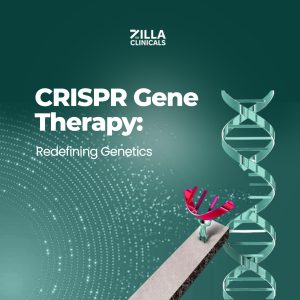
CRISPR technology has rapidly moved in the last few years and became one of the greatest scientific breakthroughs in recent times, in terms of crucial impact on genetic studies and processes. From their discovery in a bacterial immune pathway to a Genome Editor, starting from the bench till the clinical studies, the possible therapeutic use is now being scrutinized.
What is CRISPR?
CRISPR stands for “Clustered Regularly Interspaced Short Palindromic Repeats,” a new technology of genetic editing borrowed from the natural defense system of bacteria. Paired with the Cas9 protein, CRISPR works like a molecular scissor that can cut DNA at a particular place. Such is the power of precision that addition, removal, or modification of genetic material becomes possible.
CRISPR application in therapy
While this is the main bridge between clinical research and translational applications, CRISPR is leading from the front in that regard. Following the first trials in humans of CRISPR in 2016, some promising results are being observed with respect to the treatment of a number of diseases, including but not limited to those listed below.
- Blood Disorders
Applications of CRISPR-based therapies have targeted sickle cell disease and beta-thalassemia, genetic disorders resulting from mutations in genes encoding hemoglobin. Early trials have shown that the editing of the genes in stem cells can result in the return of normal hemoglobin levels and a significant improvement in the quality of life of patients. - Cancer
It involves the editing of immune cells, including T-cells, using CRISPR so that these cells can fight the cancerous cells with more effectiveness. These trials have been designed in a way to overcome obstacles like tumor evasion and immune suppression. - Genetic Blindness
Thus far, CRISPR in vivo studies have been focusing on one rare genetic disorder, Leber congenital amaurosis, that causes people to be born blind. In these studies, the CRISPR components are injected directly into the retina with hopes of editing out the faulty gene that causes this disorder. - Genetic Disorders that are Rare
CRISPR is thus under study for the performance of possible interventions on Duchenne muscular dystrophy and Huntington’s diseases, giving hope where few options have existed so far for the patients.
How Research Companies are Leveraging CRISPR
- CRISPR Therapeutics and Vertex Pharmaceuticals
These companies achieved a significant milestone with the approval of Casgevy, a CRISPR-based therapy for sickle cell disease (SCD) and transfusion-dependent beta-thalassemia (TDT). Casgevy functions by editing patients’ hematopoietic stem cells to induce fetal hemoglobin production, compensating for defective adult hemoglobin. Clinical trials demonstrated that 25 of 27 TDT patients became transfusion-independent, and 16 of 17 SCD patients were free from vaso-occlusive crises post-treatment.
- Intellia Therapeutics
Intellia continued clinical trials for their CRISPR-based therapy targeting transthyretin amyloidosis, a condition characterized by faulty protein deposits leading to heart disease. Their approach involves in vivo gene editing to reduce the production of the defective transthyretin protein.
- Locus Biosciences
Locus Biosciences initiated the world’s first clinical trial for a CRISPR-Cas3 phage therapy aimed at treating urinary tract infections. This innovative approach uses CRISPR technology to specifically target and eliminate pathogenic bacteria, offering a novel solution to antibiotic-resistant infections.
- Cure Rare Disease (CRD)
CRD developed a personalized CRISPR-based treatment for Duchenne Muscular Dystrophy (DMD). Their approach aimed to increase production of an alternate form of the dystrophin protein. In 2023, a participant received the treatment; however, the individual unfortunately passed away post-administration, marking the first death associated with a CRISPR clinical trial.
These developments underscore the expanding application of CRISPR technology in clinical settings, addressing a range of genetic disorders and infectious diseases. While promising, these trials also highlight the complexities and challenges inherent in pioneering gene-editing therapies.
Challenges and Ethical Considerations
The great potential of CRISPR faces its own lot of challenges regarding its application.
- Off-Target Effects: In a typical gene edit, off-target effects of the genome manipulations tend to be unpredictable, and further refinements of the technology should follow.
- Methods of Delivery: One of the major challenges is how to get the CRISPR components to the right cells within the body.
- Ethical Dilemmas: This opens up ethical questions on human embryo editing or enhancement in healthy individuals. A balance has to be reached between medical innovation and ethical responsibility.
The Future of CRISPR in Medicine
Yet, despite these challenges, the trajectory of CRISPR in clinical research seems promising. Improved delivery mechanisms, including lipid nanoparticles and viral vectors, enhance the precision and safety of CRISPR-based therapies. New iterations, such as base editing and prime editing, extend the toolbox in ways that enable scientists to correct point mutations without introducing double-stranded breaks into DNA.
A Fun Fact About CRISPR
Curiously, the discovery of CRISPR stems from work on bacterial immunity. When first discovered, repeated sequences in bacterial DNA were considered unimportant by researchers. Little did they imagine that such “junk” sequences would form the backbone of one of genetics’ most sensational technologies.
Conclusion
No longer a product of fantasy, CRISPR gene therapy is a harsh reality with wide-ranging implications for medicine. As clinical trials unfold, CRISPR has the potential to rewrite genetic code into a new narrative of once-incurable diseases, offering hope and changing lives. And stay tuned—the era of CRISPR is just getting started!